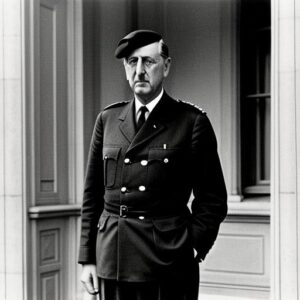Charles de Gaulle’s legacy looms large in the annals of French history. As the leader of Free France during World War II and later the first President of the French Fifth Republic, de Gaulle was a towering figure who shaped the nation’s destiny in its darkest and most transformative moments. Born in 1890, de Gaulle was not just a military leader but a visionary statesman who believed deeply in France’s role as a major player on the global stage. His steadfast commitment to French sovereignty and democracy left an indelible mark on the nation and the world.
During World War II, when France was under Nazi occupation, de Gaulle emerged as the voice of resistance. From exile in London, he rallied the French people with his famous broadcasts, refusing to accept the defeat of his homeland and laying the groundwork for what would become the Free French Forces. His leadership during this period was nothing short of heroic, as he unified and led the resistance against both the Nazi regime and the Vichy government that collaborated with them. De Gaulle’s relentless determination helped restore French pride and set the stage for the country’s liberation in 1944.
But de Gaulle’s influence extended far beyond the war. In the post-war era, he became the architect of the French Fifth Republic, established in 1958. Faced with political instability and the threat of civil war, de Gaulle crafted a new constitution that strengthened the executive branch, providing the stability necessary to guide France through the turbulent years of decolonization and Cold War tensions. As President, he pursued a foreign policy of independence, famously withdrawing France from NATO’s integrated military command in 1966 to assert the nation’s sovereignty. His vision was clear: France should be a leading world power, free from the influence of superpowers like the United States and the Soviet Union.
De Gaulle’s commitment to French independence and democracy, along with his efforts to modernize the nation, helped France emerge as a strong and stable country in the latter half of the 20th century. His legacy is one of resilience, patriotism, and a belief in the unique destiny of France—a legacy that continues to inspire generations long after his death in 1970.

